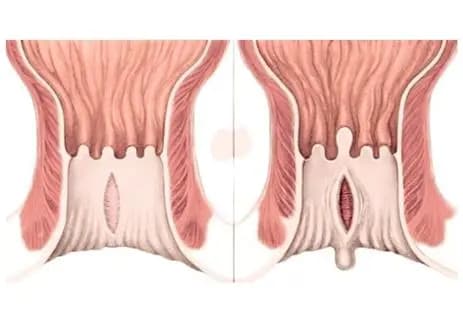Hernia Vs Hemorrhoid: What Is The Difference Between them?
Hemorrhoids is a condition caused by the enlargement and sagging of the veins around the anus.
Anal fissure (hernia) is defined as cracks that occur in the breech region.
These two disorders can be confused with each other due to the complaints they cause.
But they are different diseases.
Both diseases can make daily life difficult, cause pain when needing to go to the toilet, and reduce quality of life.
Therefore, both hemorrhoid treatment and anal fissure treatment should not be interrupted.

What Will We Learn?
What Are The Symptoms Of Hemorrhoids?
Symptoms of hemorrhoids include:
- Bleeding in the rectum.
- Bright blood in the stool.
- Swelling in the breech.
- Feeling of discharge and itching in the anus.
- Pain in the rectum.
Hemorrhoid patients may experience more than one of these symptoms in different intensities, depending on the progression of the disease.
What Are The Symptoms Of Anal Fissure (Hernia)?
Symptoms of anal fissures include:
- Feeling a sharp pain during defecation.
- Pain in the breech area.
- Swelling in the breech area.
- Difficulty defecating.
- The appearance of bright red blood in the stool.
- Itching in areas where anal fissures occur.
- Slight blood stains on underwear.
Hernia Vs Hemorrhoid
Anal fissure causes a feeling of pain that intensifies during defecation.
It is possible for hemorrhoids to cause pain as well.
However, it does not cause pain as much as anal fissure.
Likewise, anal fissure causes bleeding in the form of leakage, while hemorrhoids cause bleeding in the form of drips.
By observing such signs, it is possible to distinguish between anal fissure and hemorrhoids.
However, the definitive diagnosis of both disorders can only be made by a physician who is an expert in the field.
Take Care Of Rectal Bleeding
Rectal bleeding (blood from the rectum) is a condition that should not be neglected.
When bleeding is noticed, it is necessary to immediately consult a general surgeon or gastroenterology specialist.
One day, you go to the toilet as usual, while you are cleaning, you see that you are bleeding.
What should we do, ignore it or investigate the cause as soon as possible?
While some diseases that cause rectal bleeding disrupt our comfort of life, some diseases may threaten your life.
Unfortunately, in our society, because the examination of the perianal region (breech and its surroundings) causes embarrassment in men and women, patients seek remedies on their own and sometimes cause delayed diagnosis in life-threatening diseases.
Our bodies have ways to dispose of various wastes.
Any bleeding that may occur from these is not normal.
In all kinds of bleeding from the urine, vaginal or rectal route or from the mouth, the reasons may be simple, but it may also be a harbinger of a very serious and frightening cancer.
We can see bleeding in various ways.
Staining on toilet paper can be obvious, such as staining with feces, dripping after the toilet or squirting from the anus, or it can be insidious in a way that we do not notice.
Until we became weak from anemia.
There are various causes of rectal bleeding in all age groups.
Cancer is detected in approximately 4% of all rectal bleeding.
If you have any bleeding, contact your doctor without waiting.
Our article on Abscessed Tooth may also catch your attention.
